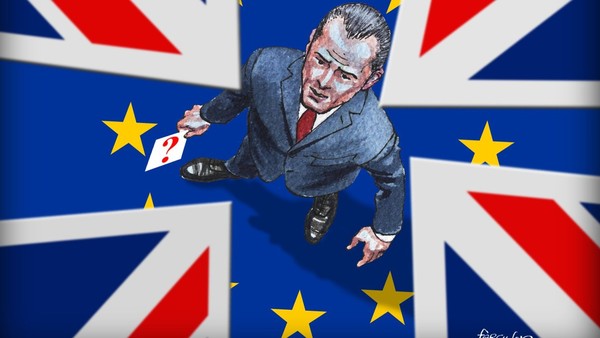This is a bit naughty, but here's an FT Editorial that nicely puts forth my own point of view on this issue....
Why true democrats should vote to remain in the EU
Gideon Rachman
Europe is the friend of democracy, not its enemy
I
just want the
EU referendum to be over now. The horrific killing of
Jo Cox, only a week before the vote, will overshadow the result, whatever it is.
The killing of the opposition Labour party MP, a passionate believer in British membership of the EU, was an act of deranged evil that cannot be blamed on the Leave campaign. But it took place against the backdrop of an increasingly bitter referendum process, in which words such as traitor, liar and racist are being chucked around all too frequently.
Referendums are not like elections, whose results can easily be reversed a few years later. They feel like historic turning points. That makes people desperate and sometimes angry. I know because, as someone who strongly wants Britain to remain inside the EU, I have felt my own emotional temperature rise during the campaign. I have cursed at the television, fired off intemperate tweets at Leave campaigners, written furious emails to friends and enemies on the other side of the debate — and then usually had the wisdom not to press send.
In my calmer moments, I know that these politically charged rows serve no purpose other than to alienate friends. More important, if I am honest with myself, there are actually parts of the Leave case that I agree with.
I cannot dispute that the EU is a dysfunctional organisation. Nobody looking at the euro crisis — with its bitter divisions, deep recessions and endless emergency summits — could regard it as a triumph of public policymaking. The
migrant crisis has once again exposed deep rifts within the union; and constitutional structures that make it all but impossible to frame effective policies quickly. None of this makes me optimistic about the EU’s ability to respond nimbly to future crises.
I also think that the questions of immigration and sovereignty stressed by the Leave campaign are legitimate issues. Some of the Leavers’ rhetoric has strayed into racism and dishonesty. But it is not inherently unreasonable for voters to want to control the numbers of immigrants that Britain receives from the rest of the EU.
So I will not be surprised if Britain votes to leave. And I do not think that all Leave voters must be cretins or racists, which sometimes seems to be the unstated assumption of a few Remain campaigners.
Given all that, why am I still on the Remain side? My reasons are practical and emotional; political and economic.
On the practical side, I think a vote to leave the EU will open the door to years of economic and political chaos. The Leave campaign’s demand to “take back control†of immigration policy will mean that Britain has to opt out of free movement of people within the EU — and with it, the EU’s internal market. So we are likely to face tariffs on manufactured goods and non-tariff barriers to vital service industries such as finance.
I also can see no way that the EU and the UK will be able to conclude a new trade deal quickly. The negotiation process will be protracted and difficult, and that will create an increasingly acrimonious relationship between Britain and its neighbours.
That kind of division and anger within the community of European democracies is not just unnecessary; it is also dangerous. We are no longer living in the post-political paradise of the 1990s.
The Middle East is imploding, military tensions between Russia and the west are rising, the US is flirting with electing a race-baiting demagogue as its next president and an authoritarian China is intent on becoming the dominant power in Asia. In this kind of international environment, it would be madness for Britain to devote the next five years to arguing with our friends and neighbours in Europe.
The Leavers say that their campaign is all about saving British democracy, by restoring the sovereignty of parliament. But in the European context the EU is the friend of democracy, not its enemy. The countries that joined the EU after the fall of the Iron Curtain were leaving behind authoritarian systems and signing up to a charter of civil and political liberties laid out in the EU treaties.
The “Brussels bureaucrats†may infuriate some in Britain. But elsewhere in Europe they stand for the rule of law and equal rights for all citizens and nations. Those in Britain who doubt that should look at the forces in continental Europe clamouring for the destruction of the EU — they are the nationalists, the racists, the authoritarians, the far right and the far left. These are the people who would feel strengthened and emboldened by Britain leaving the EU. Cox’s killing reminds us that dark political forces, nourished by hatred and violence, can also flourish in the UK.
For all its flaws, the EU remains the best guarantee of co-operation between the people and nations of Europe. All those enervating EU summits serve a vital purpose. They force the leaders of Europe to work together as colleagues rather than screaming at each other from behind national ramparts.
A British vote to leave the union now would pour fuel on to the fires of nationalism that are smouldering just beneath the surface in the EU. It is in the interests of both the UK and Europe that Britain plays its part in keeping those fires at bay. I will vote for a Britain that remains at the EU table — and that can be a respected, engaged and wise voice in helping the whole of democratic Europe to negotiate the crises to come.
gideon.rachman@ft.com



 $$$$$$
$$$$$$
